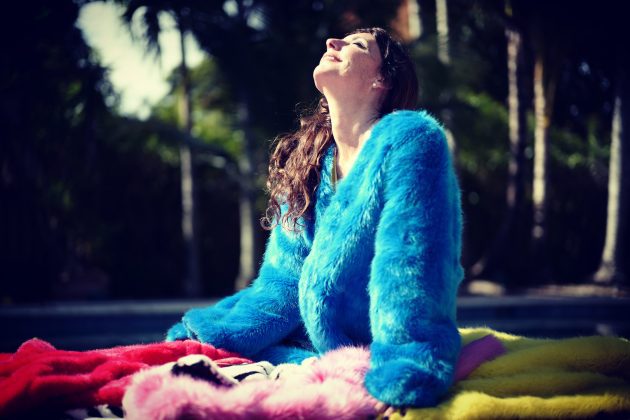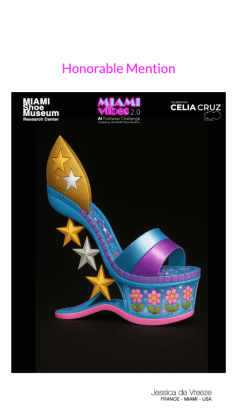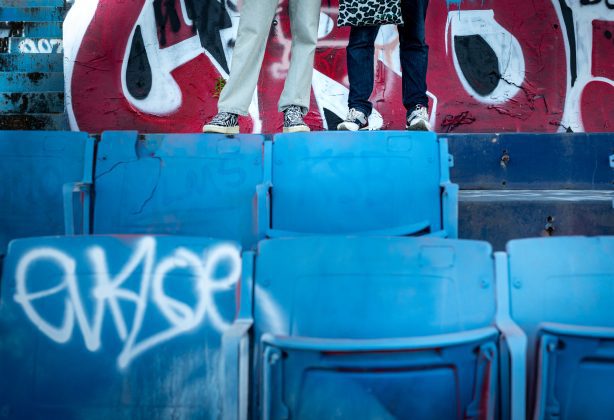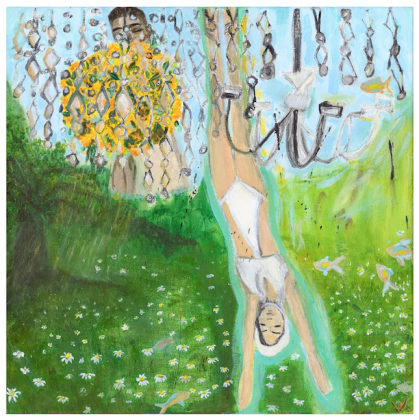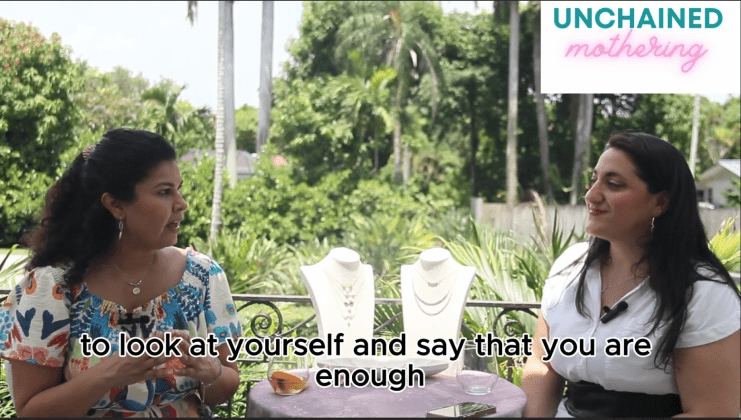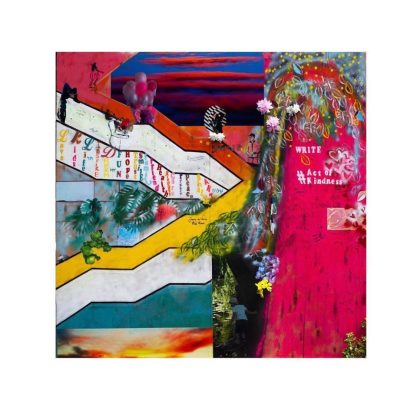|
Getting your Trinity Audio player ready...
|
Jessica de Vreeze Honors Celia Cruz and Mothers’ Invisible Labor at Art Basel Miami
Jessica de Vreeze had experimented with augmented reality before, but she had not expected artificial intelligence to enter her artistic practice — until Celia Cruz gave her a reason to try.
When the Miami Shoe Museum announced a challenge celebrating the centennial of the legendary singer, the Paris-born, Miami-based artist felt an immediate pull. It wasn’t technology that drew her in, but the woman behind the icon: a force of joy and courage whose presence radiated far beyond the stage. “Celia Cruz was a beacon,” de Vreeze says. “Her presence lifted people. I wanted to learn more about her — and offer something back.”
The jury recognized the intricacy of the cantilevered shoe de Vreeze created in Celia’s honor — a sculptural form built with detail, intuition, and reverence — selecting her as a finalist in Miami Vibe 2.0, an international challenge organized by the Miami Shoe Museum, founded by visionary designer Luis Valenzuela. Known for its unconventional, forward-looking curatorial lens, the museum placed de Vreeze among a circle of creators exploring the intersections of design, AI, and cultural identity, awarding her the honorable mention of the jury. She is the only French artist in the group — a detail that speaks less to nationality than to perspective. “I always feel between places,” she says. “It’s where my work breathes.”
The exhibition opened on October 6 at the InterContinental Hotel Miami and will be presented throughout Art Basel Miami Beach — another step in a long, coherent arc.
Born and raised in Paris, de Vreeze grew up seeing a woman who proved — every day — that the impossible was, in fact, possible. Her mother, Dr. Danièle Goldberg, trained within the ranks of the Assistance Publique–Hôpitaux de Paris. At a time when few women held such positions, she became one of the first women rheumatologists to lead a hospital service in her forties. For her, being a doctor and caring for patients was never a question of gender — the responsibility itself demanded everything, no matter who carried it. And she did so while raising two daughters with devotion, rigor, and grace, supported by her own mother.
“My mother showed me it was possible — hard, but possible,” de Vreeze says. “She held a demanding profession, carried immense responsibility, and mothered us fully — all at once.”
Years later, de Vreeze would face her own version of that tension: managing seven-figure legal files in Luxembourg while keeping motherhood at the center of her decisions, without the multigenerational support that had shaped her childhood. Her mother’s path became both a mirror and a map, illuminating the impossible choices many women carry alone — and the courage it takes to claim a different life. Every woman should be able to choose how she wants to live, work, and raise her children. There is no one scenario that fits all — but one truth remains constant: mothers hold their children at the center of their hearts and their choices.
Art became the bridge — never as a hobby, but as the vocation she had carried since adolescence. And she had something many women across the world still fight for: the right to an education and the right to work. De Vreeze would later understand how these rights made her own motherhood possible — rights she believes must never be negotiable, especially if society is to truly value women’s choices.
Her work is now collected in more than sixty cities, across eighteen countries and four continents. Museums have taken notice too: earlier this year, her photograph Keep on Dancing won the People’s Choice Award at the Coral Gables Museum before being acquired into its permanent collection. In Doral, her 72 × 72-inch diptych The Empress — emblem of Unchained Mothering — opened the International Women Artists Exhibition at the Cultural Art Center. Recognition arrived again in Beverly Hills when she received the Social Impact Award from The Art Estate Magazine.
To understand de Vreeze’s place in this moment, however, one must look at the project she has been shaping — slowly, steadily — alongside her artistic practice: Unchained Mothering, created in March 2022 and granted 501(c)(3) status in September 2023.
At its core lies a simple but seismic idea:
Show, through art, the invisible work of women and mothers.
Make women’s choices valued, visible, and free.
Women raising children while advancing careers.
Women pausing their ambitions to hold families together.
Women whose intellectual, emotional, and physical labor sustains communities — often without acknowledgment.
“These are universal stories,” de Vreeze says, “because behind every mother is a woman asking herself how she can give the best to her children — often doing the impossible while doing it.” Her work is about honoring the woman in full: giving birth, carrying families, striving for independence, juggling full-time roles inside and outside the home, or being absorbed entirely into the home without visibility or recognition.
What began as three sets of portraits exhibited in New York has grown into a nonprofit that pairs art with community-building activities. Unchained Mothering’s public presence has expanded with remarkable organic force. Miami has also hosted two of de Vreeze’s public commissions — a 15-foot mural downtown and a 9-foot installation in Coconut Grove — as well as the artistic logo representing the historic West Grove community.
De Vreeze brings together artists across disciplines — photography, painting, mixed media, music, dance, sculpture, poetry, video, and augmented reality — each lending a different angle of light to the same truth. Among them are Bardazzi, Byers, Dris, Guardia, Kartheiser, Myers, Paris, Rey, Tavernier, and de Vreeze — artists whose works echo and expand the project’s emotional architecture.
The women whose stories form this chapter create a constellation of their own: Carolina Quilhot Avaria, Jennifer Chen, Manuela Fisher, Viki Galchen, Dr. Tamar Magnas, Ellen Sandor, Guillemette Turquin, and Maureen Brady Atinsky — women whose experiences and quiet revolutions shape the invisible scaffolding of our world. And so many more stories remain to be told.
Alongside them stands the inner circle that keeps Unchained Mothering standing: Pooja Arora, Jennifer Chen, Géraldine Guardia, Adria Stapleton, Jennifer Weiser, and Kristen Grimberg, whose recent 1st-place finish at the Miami Give 5K placed the nonprofit on the podium for the first time — a symbolic victory for a mission built step by step.
And now, with Art Basel Miami approaching, the project enters its boldest chapter yet. On December 3, Unchained Mothering will unveil If You Would See — Parallel Worlds, an augmented-reality installation produced in collaboration with JC Fractal (Juan Carlos Gallo) — the visionary behind Miami AR IO, whom de Vreeze sought out after collaborating with him twice before on AR installations across Wynwood between 2023 and 2025.
A phone becomes a portal; the street becomes a stage; women once unseen begin to appear.
“If all women and all mothers knew their worth,” de Vreeze says, “society would transform at every level.”
Her conviction finds echoes in the nonprofit’s growing community, which recently completed its first Give Miami Day campaign and now enters this year’s Giving Tuesday with renewed momentum — small, grassroots steps that mirror the very spirit of the movement. Each dollar given brings Unchained Mothering closer to telling more women’s stories — stories that shape the world quietly, yet powerfully, all genders standing side by side.
What de Vreeze is building is not a brand but a world — one stitched from the places she has lived, the people she has met, and her unshakable belief that art still has the power to shift the ground beneath us.
For those who wish to enter that world, the path is simple:
 Download the AR Miami app
Download the AR Miami app
 Follow @unchained_mothering & @jessicadevreeze
Follow @unchained_mothering & @jessicadevreeze
 Support the movement on Giving Tuesday
Support the movement on Giving Tuesday
 Discover and collect de Vreeze’s work
Discover and collect de Vreeze’s work
Because everything changes — quietly, then all at once — when women are finally seen.


